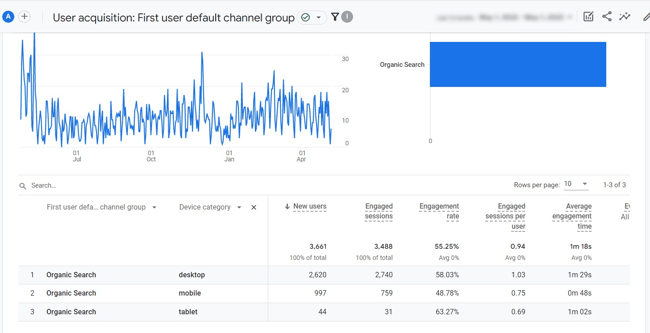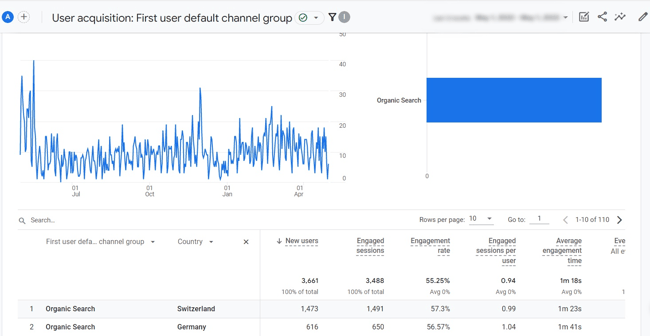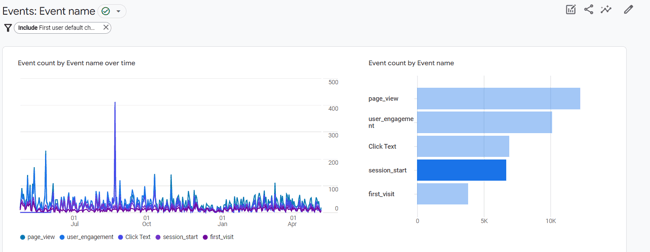In today's digital landscape, online competition is fierce, making it critical for businesses to increase their online visibility. Search Engine Optimization (SEO) plays a crucial role in improving search engine keyword rankings and thus helping brands to increase their digital footprint.
To measure the success of your SEO efforts, it's essential to track key performance indicators (KPIs). These metrics provide valuable insight into your website's performance, such as visitor numbers, engagement and conversion rates. Regardless of the nature of your business, whether you run e-commerce or SaaS, tracking KPIs is critical to improving your website's SEO performance. By identifying and regularly tracking KPIs, you can evaluate the effectiveness of your SEO strategy and make data-driven decisions to optimise your site's performance. Tracking KPIs is an essential part of achieving your SEO goals and driving business growth.
However, tracking SEO performance can be overwhelming, especially for those who lack technical expertise. In this article, we will present you with a list of KPIs for SEO that are easy to track even for non-SEO experts. We will explore how tracking specific metrics can help businesses achieve their SEO goals. We will demonstrate how these KPIs can provide valuable insights into your website's SEO performance and how you can measure them yourself, without complicated Excel formula sheets and expensive monitoring tools.
If you want to improve your website's SEO performance, with our expertise and tools, we can help you track the right KPIs, analyse your website's performance and optimise your SEO strategy to achieve better results. Book our 8-hour package with one of our SEO Superhero Specialists to take your website to the next level.
Table of Content
- 15 Actionable SEO KPIs to Measure Your Website's Success Without the Need of a SEO Degree
1.1 Organic Traffic
1.2 Organic Traffic by Location
1.3 Organic Traffic by Device
1.4 Return to Investment (ROI)
1.5 Organic Visibility
1.6 Keyword Rankings
1.7 Commercial Intent Ranking Keywords
1.8 Backlinks
1.9 User Engagement
1.10 Branded vs. Non-Branded Traffic
1.11 Average Time on Page
1.12 Bounce Rate
1.13 Click-Through Rate (CTR)
1.14 Scroll Depth
1.15 Content Depth - Boost your SEO performance with these 15 Key Performance Indicators for Non-Expert
15 Actionable SEO KPIs to Measure Your Website Success Without the Need of a SEO Degree
We provide you here, 15 actionable SEO KPIs that can help you measure your website's success without the need for a degree in SEO. Tracking these KPIs can provide valuable insights into your website's performance and help you optimise your SEO strategy to achieve better results.
Our list includes metrics such as organic traffic, bounce rate, conversion rate, keyword rankings, backlinks and more. These KPIs are easy to track and can help you monitor the effectiveness of your SEO strategy.
1. Organic Traffic
Organic traffic is probably the most important SEO KPI that measures the number of visitors who find your website via search engines without paid advertising (organically). This metric is essential because it reflects the effectiveness of your SEO strategy in driving relevant traffic to your website. By analysing your organic traffic, you can gain insights into the performance of your website's content, keyword targeting, and technical SEO factors such as site speed and mobile-friendliness.
Organic traffic represents the highest quality traffic source, with visitors actively searching for information or products related to your business. Moreover, organic traffic is free, making it a cost-effective way to generate leads and conversions.
By tracking organic traffic, you can identify opportunities to optimise your website for search engines and your users, and drive more relevant traffic to your website. Therefore, if you want to measure the success of your SEO efforts, organic traffic is the first metric to keep an eye on.
Tools you can use to monitor Organic Traffic as an SEO KPI
- Google Analytics: This is a free tool that provides comprehensive data on website traffic, including organic traffic. You can track the number of organic visits, the average session duration, bounce rate, and more.
- Ahrefs: This is a paid tool that offers a wide range of SEO features, including organic traffic analysis. You can use it to monitor your organic search rankings, track the performance of your content, and analyse your competitors' organic traffic.
- SEMrush: This is another popular paid SEO tool that provides data on organic traffic. You can use it to track your organic search rankings, analyse your website's visibility in search engines, and identify opportunities for improvement.
- Moz: This is a suite of SEO tools that includes a feature for tracking organic search traffic. You can use it to monitor your website's search visibility, track keyword rankings, and identify opportunities for improvement.
- Serpstat: This is another paid tool that offers a range of SEO features, including organic traffic analysis. You can use it to track your organic search rankings, analyse your website visibility in search engines, and identify opportunities for improvement.

Organic Traffic Report in Google Analytics 4
2. Organic Traffic by Location
For businesses that prioritise local marketing, the Organic Traffic by Location metric is crucial. It assesses the geographic areas that generate the most organic traffic to your website.
Local or physical presence is important for SEO because search engines prioritise local search results for queries that include geographic keywords, such as "near me" or "in London", for example. Optimising your website for local SEO can increase your visibility in local search results and drive more traffic from users who are actively searching for products or services in your area.
Tracking organic traffic by location can help you identify opportunities to expand your business to new geographic markets or optimise your website content to appeal to specific local audiences.

3. Organic Traffic by Device
Continuing with the organic traffic KPI, you should also keep an eye on the Organic Traffic by Device. It measures the percentage of visitors accessing your website via desktop and mobile devices. This metric is important because it helps you understand how users are accessing and interacting with your website. This allows you to optimise the design and functionality of your website to improve the user experience.
With the majority of internet usage now coming from mobile devices, optimising your website for mobile devices has become a crucial factor for ranking well in search results. Google has even moved to mobile-first indexing, which means that the mobile version of your website is considered first for ranking.
By tracking organic traffic by device, you can identify opportunities to improve your website's mobile responsiveness and ensure that users have a positive experience regardless of the device they use to access your site. Moreover, providing a seamless user experience across all devices can increase engagement, reduce bounce rates, and ultimately lead to more conversions.
.webp?width=626&height=321&name=undefined-May-02-2023-04-52-08-8333-PM%20(1).webp)
4. Return of Investment (ROI)
Return on Investment (ROI) measures the profitability of an investment in SEO. It is the only KPI that gives you the direct answer to whether the time and efforts of your SEO are truly effective. Unlike paid advertising, which can deliver immediate results and ROI calculation, SEO is a slow and ongoing process that can take several months or years to see tangible results.
This is because SEO involves creating high-quality content, building backlinks, and optimising your site's technical structure, which takes time to show results in search engine rankings and organic traffic.
While it's challenging to calculate the ROI of individual SEO tactics, it's crucial to measure the overall ROI of your SEO strategy after at least six months of implementation. This will help you determine the impact of your SEO efforts on your business's bottom line, including increases in organic traffic, higher search engine rankings, and ultimately, more conversions and revenue.
It's important to understand that SEO is a long-term investment, and ROI calculation should be done with a strategic and patient approach.
5. Organic Visibility
Organic Visibility, also sometimes called Search Visibility, evaluates the amount of online exposure your website receives in search results for specific keywords. It is essential to track Organic Visibility since it indicates the extent to which your website is visible to users searching for relevant terms in search engines. Organic Visibility is extremely useful if you want to monitor the early results of your website optimisation.
Google Search Console (GSC) provides a rough overview of your website's visibility by analysing impressions for ranking keywords over a period of time. By monitoring changes in impressions over time, you can evaluate the effectiveness of your SEO efforts and make data-driven decisions to improve your visibility in search results.
Thanks to this KPI, you can identify trends and make strategic decisions to improve your website's performance in search results, resulting in increased organic traffic, higher engagement, and ultimately, more conversions and revenue. Find out how our team can maximise your online presence, with a customised and tailored SEO strategy. Contact us now for a free consultation and start ranking higher.
6. Keyword Rankings
Monitoring keywords rankings in search engine results pages is another essential SEO measure that you need to determine the effectiveness of your SEO efforts. By tracking your keyword rankings, you can identify which keywords your website is ranking for and which keywords need improvement. Furthermore, keyword rankings are closely tied to organic traffic. By monitoring your keyword rankings and making necessary optimizations, you can increase your visibility in search engines, leading to more clicks and traffic to your website.
Tracking keyword rankings is an ongoing process and requires effort and time to understand why certain results are dropping and to explore other opportunities that arise.
W4 SEO Superhero Specialists can help you determine a set of relevant keywords for your business by conducting comprehensive keyword research and analysis. They can help you identify the most valuable keywords for your business and optimise your website content and structure to improve your keyword rankings.
Working with one of SEO Specialists can help you achieve higher keyword rankings and improve your online visibility, leading to more conversions and growth for your business.
7. Commercial Intent Ranking Keywords
The next KPI for SEO is Commercial Intent Ranking Keywords. They are search terms that indicate a strong intent to purchase or convert. These keywords are important because they attract visitors who are more likely to become customers.
Commercial Intent Ranking Keywords can be identified through keyword research and analysis of search volume, competition, and user intent. Once you have identified your Commercial Intent Ranking Keywords, you can track their rankings and monitor their performance over time.
By identifying the keywords that drive the most high-intent traffic to your site, you can focus your SEO strategy for those keywords to increase the likelihood of conversions.
8. Backlinks
Backlinks are the SEO KPI that analyse the number and quality of external links pointing to your website. These links serve as proof of trust from other websites and show search engines that your website is a valuable and trustworthy source of information.
The link metrics you should to keep an eye on are:
- Backlinks to specific pages on your website: This will help you build a good backlink profile to rank better on Google.
- New backlinks: New backlinks from high authority websites show you that your content is high quality and you are doing good SEO.
- Lost backlinks: If you track the backlinks your website has lost, you can find out the reason and take action.
- Backlinks referral traffic: you can see which backlinks are bringing traffic to your website
- Quality of Backlinks: The number of backlinks is as important as their quality. You need to check the authority of the website that is linking to you.
- Relevance of backlinks: If you are linked to a website whose content is not really relevant to your business, it will have a negative impact on your ranking.
Analysing the number and quality of backlinks to your website can help you assess the authority and reputation of your website in your industry or niche. You can identify opportunities to acquire new high-quality backlinks and eliminate any harmful links that may be negatively impacting your website's performance in search results.
Having a strong backlink profile means your website's rankings in search results can improve, have more traffic, and ultimately can generate more leads for your business.
9. User Engagement
Tracking user engagement on your website is a critical component of measuring SEO KPIs. By monitoring metrics such as clicks, page views, scrolls, and video progress, you can gain insights into the effectiveness of your SEO strategy in driving relevant traffic to your website.
For instance, clicks can indicate how successful your calls-to-action are in driving users to take a desired action on your website, such as making a purchase or filling out a form. Page views can help you understand which pages on your website are most popular and engaging for your target audience. Scrolling can reveal how users are interacting with your content and whether they are finding it interesting and relevant. Video progress can show how effective your video content is at capturing and retaining users' attention.
Overall, tracking user engagement metrics can help you optimise your website's content and structure to improve the user experience and increase conversions. As a result, it can also help you achieve your SEO KPIs, such as improving organic traffic, increasing dwell time, and reducing bounce rates.

10. Branded vs. Non-Branded Traffic
By comparing the two SEO KPI Branded Traffic and Non-Branded Traffic, you can measure the percentage of traffic your site receives from search terms that include your brand name or those that do not.
Branded traffic represents users who already know your brand and are searching specifically for it, while non-branded traffic represents users who are searching for information related to your products or services but may not be familiar with your brand.
When you compare the amount of traffic generated by each search term, you gain insight into the effectiveness of your branding and marketing efforts. An increase in branded traffic may indicate that your brand awareness is growing along with your conversion rate, while an increase in non-branded traffic may indicate that your content and SEO strategies are effective in getting traffic from new users who are not yet familiar with your brand.
11. Average Time on Page
The Average Time spent on a page is an important SEO KPI, which measures the average time visitors spend on your web pages after arriving from any source. This metric provides valuable insight into the quality and relevance of your content, as well as the overall usability of your site. The longer the average time spent on a page, the more engaged your visitors are and the more likely they are to convert.
To improve this metric, you can optimise your content to ensure it's relevant, engaging, and meets the needs of your target audience. You can also improve the user experience of your website by making it easy to navigate, visually appealing, and fast loading.
By tracking average time spent on page, you'll gain a deeper understanding of how visitors interact with your site and take action to improve your SEO performance.

12. Bounce Rate
The Bounce Rate is an essential SEO KPI that indicates the percentage of visitors who exit your website after exploring just one page. It is a significant metric to improve your website's performance and evaluate user engagement.
The factors that cause a High Bounce Rate are:
- The information users are looking for is not relevant
- The content is not informative enough
- You are targeting the wrong audience
- Poor page layout
- Slow loading speed of the web page
- No additional internal links or CTA that take the visitor to another web page
A high bounce rate can also have a negative impact on other SEO KPIs, such as shorter average session duration or lower on-page engagement. But what is considered a good percentage? This value varies greatly depending on the industry, country, browsing device, and the purpose of the web page. So, a bounce rate of 80% does not necessarily mean something negative.
To improve your website bounce rate, you need to analyse user behaviour and make adjustments to improve the user experience. By measuring the bounce rate of specific pages in segments, you can find out exactly which pages and which section of the website need to be optimised. You can segment your bounce rate by target audience or topic and then know which aspects you need to work on.
Oprimising your website's landing pages and navigation, improving your website's loading speed, and using clear and concise content can help reduce bounce rate. By improving your site's bounce rate, you can engage visitors and encourage them to stay on your site longer, which increases the likelihood that they will take a desired action, such as making a purchase or filling out a contact form.
13. Click Trough Rate (CTR)
Click Through Rate (CTR) is another essential SEO KPI that measures the percentage of clicks your website receives from the search engine results pages. A high value of CTR indicates that your website's meta title and description are effective in attracting clicks from users. A high CTR can lead to better conversions and ultimately more sales for your business.
This KPI is significant for your SEO because it directly affects your website's organic traffic and visibility in search results. By analysing CTR, you can determine which pages and keywords are performing well and which need to be optimised.
14. Scroll Depth
Scroll depth is a SEO KPI, which measures how far visitors scroll down each page of your website. It provides insight into how engaging your content is and how well it maintains visitors' attention. You can measure how far down your page your visitors have scrolled by using a trigger in Google Tag Manager, for example. A good percentage is considered achieved when you reach 70% of the scroll depth.
By analysing scroll depth data, you can understand which content sections are getting the most attention and which sections visitors are more likely to ignore. This will help you optimise your website's design, layout, and content to improve engagement and user experience. Measuring scroll depth can also help you identify issues like slow-loading content, design problems, and broken links that could be contributing to a high bounce rate. By improving these factors, you can increase the overall usability of your website and increase your chances of ranking higher in search engine results pages.
15. Content Depth
Content Depth is another important SEO KPI that assesses the significance and importance of the information displayed on your website. The importance of Content Depth lies in its ability to impact user engagement, bounce rate, and search engine rankings. High-quality content that delivers extensive information on a specific topic is more likely to be shared, linked to, and attract more visitors to your website. Hence, regularly evaluating the depth of your content is crucial to improve the performance of your website and optimise it for ranking higher in search engines.
To measure the depth of content, you can use metrics such as time spent on page, average session length, and number of pages visited per session. Analysing user behaviour and feedback can also help you identify areas where you need to improve your content. Providing valuable and comprehensive content is key to a successful SEO strategy.
Boost Your SEO Performance with These 15 KEY Performance Indicators for Non-Experts
In conclusion, tracking the right SEO KPIs is critical for improving your website's visibility and driving more organic traffic. By monitoring the 15 key performance indicators we discussed, you can gain valuable insights into your SEO performance and make data-driven decisions to optimise your site for search engines. However, SEO is a complex and ever-evolving field, and it can be overwhelming to keep up with all the latest trends and best practices.
That's where W4's SEO experts come in.
From keyword research to link building and content optimization, we'll guide you through every step of your SEO strategy. Our specialists consider a broad range of factors to enhance your site's performance, beyond the 15 key performance indicators we discussed. Contact us today to learn more about how we can help you achieve your SEO goals.




.webp)



.jpg)

